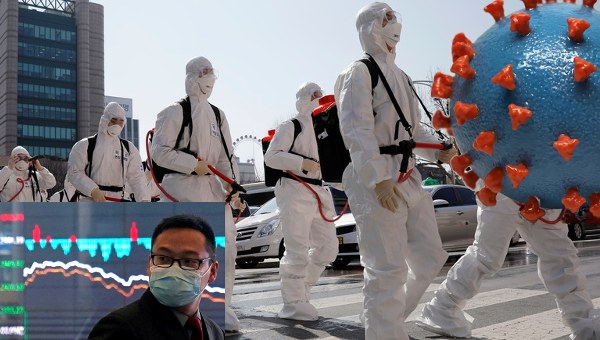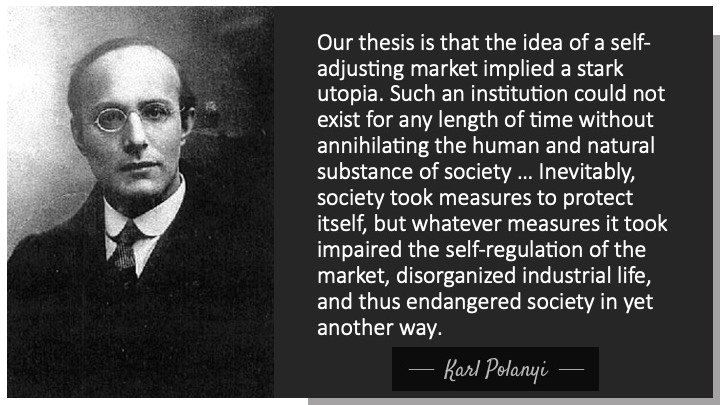Capitalism, Coronavirus and the Road to Extinction
The Godzilla-like image of the virus Covid-19 has been haunting the world. Not only has the virus unraveled nightmarish possibilities leading to the extinction of millions of people, but it has also served as a quintessential case revealing the structural contradictions of and existential threats posed by capitalism on a global scale.

Several researchers agree that Covid-19 is quite an unprecedented virus. Unlike seasonal influenza, Covid-19 is ten times deadlier, and we have yet to develop a medical remedy or herd immunity to slow it down; the best estimates for the development of a vaccine are at least three to six months away.
The virus’s mortality rate seems much lower than earlier pandemics (such as Ebola [1994], Avian flu [1997], SARS [2002], MERS [2012]); yet the manner in which Covid-19 spreads, i.e., its mode of infectivity, seems radically different. Unlike earlier pandemics, the virus has proved infectious even before carriers display any symptoms, which renders it often undetectable during the 14-day incubation period.
Facts on the Ground
Given that we are unable to detect or cure it, we are completely helpless against the virus’s global march. Emergency measures such as compulsory quarantines, social-distancing and improved hygiene standards may temporarily slow down the virus’s pace, yet once these measures begin to be relaxed – as they surely will be – it is very likely that the virus will be at our door again. This grim picture gets even more complicated by the fact that the virus is likely to go through several mutations. The virus may increase its adaptability to new climatic and generational circumstances, hence targeting not only the elderly, but a broader age group even when summer arrives in the northern hemisphere.
Covid-19 is not the first ‘modern’ pathogen with global consequences. The Spanish Flu (1918), for example, was sweeping in terms of its geographical span as well as devastating in terms of its death toll. As Mike Davis notes, the Spanish flu broke out at a time when billions were still in the process of being (forcibly) incorporated into the capitalist world market. The expansion of markets eliminated the very basis of safety-first agriculture, undermining local reciprocities and solidarities that traditionally provided welfare to the poor during crises. Indeed, what prepared the ground for its outbreak and exacerbated the impact of this early 20th century pathogen was the deterioration of nutritional standards under market imperatives as well as the exigencies and scarcities caused by the Great War.
Covid-19, by contrast, has begun its journey and taken its biggest toll thus far in the most advanced and affluent parts of the world. This is to say, the contagion is no longer limited to the persistently undernourished, underdeveloped, and war-torn parts of the world; its impact is no longer restricted to a distant wet market or a third world country alone. Instead, it has emerged and expanded in the very heart of the capitalist world order at a time when capitalism has not only been already firmly established across the globe but has been testing the eco-biological limits of the entire planet.
Should things remain the same, Covid-19 and its future cousins are likely to claim the lives of not just ‘some’ people as they did in the past, but of humanity as a whole. In this sense, perhaps for the first time in modern history, the biological blitzkrieg activated by the coronavirus has thrown into sharp relief the immediately existential and undeniably global contradictions and consequences generated by capitalism.
Contradictions on a Global Scale
Critical biologists and epidemiologists have put the blame on industrial agriculture as the root cause of the emergence of new pathogens since the 1990s. According to Rob Wallace, giant agribusiness and resource extraction firms have now reached the last virgin forests and smallholder-held farmlands in the world, subordinating them to the logic of capitalist markets.
The loss of the ecological diversity and complexity of these huge tracts of land has increasingly forced wild food operators to hunt in previously untouched parts of the jungle, which, in turn, has increased “the interaction with, and spillover of, previously boxed-in pathogens, including Covid-19.” Likewise, global warming has forced or allowed pathogens to escape their natural habitat. As a result, new viruses against which we have no immunity “are being sprung free, threatening the whole world.” In short, as John Vidal writes, “we disrupt ecosystems, and we shake viruses loose from their natural hosts. When that happens, they need a new host. Often, we are it.”
That some agribusiness firms have been blatantly risking lives for profit would not come as a surprise to the critical reader. Even Bill Gates has been sounding the alarm about the potentially deadly consequences of irresponsible business practices and new viruses. Yet, what tends to remain underemphasized in these debates is that the blame belongs neither solely to ‘greedy’ firms that have driven viruses out of their natural habitat, nor to ‘short-sighted’ politicians who have not invested enough in vaccine technology or national health systems. Instead, the problem is rooted in the very structure and rationality of the system as a whole. That is, we may go extinct as a result of the ‘successes’ of the very system ‘we’ created in the first place, i.e., capitalism.

How did we end up losing control of an ‘economic’ system of our own making? This is indeed an anomaly in human history. The conception of the ‘economy’ as an autonomous sphere dictating its own rules over society did not exist in non-capitalist societies. As the economic anthropologist Karl Polanyi put it, “neither under tribal, nor feudal, nor mercantile conditions was there… a separate economic system in society.” The economy either “remained nameless” or had “no obvious meaning,” for the economic process and prices were instituted through non-market means, such as kinship, marriage, age-groups, status, political patronage, etc. Even “where markets were most highly developed, as under the mercantile system,” the economic system, as a rule, “was absorbed in the social system” and showed “no tendency to expand at the expense of the rest.”
In this sense, the market with a distinctive logic, autonomy, and dynamic of its own was completely unknown to our ancestors, and indeed, the emergence of the idea of ‘self-regulating’ markets represented a complete reversal of the way in which past economies functioned.
In order for ‘self-regulating’ markets to ‘self-regulate’, a variety of political and institutional arrangements had to be initiated to progressively eliminate the non-market survival strategies that humans previously relied upon. Most notably, the age-old communal systems of social and moral regulation needed to be eradicated, a process that systematically subordinated the ‘natural and human substance of society’, i.e., land and labour, to market relations for the first time in history.
Rise of Capitalism
At the heart of the rise of capitalism, therefore, rested a ‘political’, legal, and violent process that led to the historically unprecedented characterization of land and labour as commodities. Without commodifying land and labour, i.e., without treating the planet’s living substance as commodities, it would have been impossible to view the ‘economy’ as an institutionally and motivationally self-regulating sphere of life, an almost robotic creature functioning at the expense of human lives and livelihoods.
Capitalism presupposed from the very beginning a radical transformation in the human use of nature as well as in the provision of life’s essential requirements. In this sense, the danger of global extinction which we have been going through is not a temporary hiccup in an otherwise smoothly operating capitalist ecosystem but has always been a possibility built into the very structure of market society.
On the one hand, by treating land and labour as commodities, by subjecting people’s utilization of land and enjoyment of life to their ability to continuously increase market competitiveness and productivity, capitalism has enabled massive technological advancements in all spheres of life. This, in turn, has generated, above all, an unprecedented potential to feed, clothe, and accommodate an ever-increasing world population.
On the other hand, however, as Ellen Wood argues, by subordinating all other considerations to the imperatives of market competition, capitalism has also created poverty, homelessness, environmental destruction and pandemics. Billions of people who could be fed and housed are subjected to immense doses of insecurity, living their lives under the constant threat of joblessness, homelessness, loss of status and starvation. In a similar fashion, the environment that could be protected is systematically destroyed for profit, and killer viruses that could be contained are unleashed.
Undoubtedly, Covid-19 has become the archetypal example that lays bare “the destructive impulses of a system in which the very fundamentals of existence are subjected to the requirements of profit.”
Can the ‘positive’ and ‘negative’ outcomes of capitalism be somewhat reconciled? Indeed, for a brief period in the Global North, it seemed they could be. During the so-called Golden Age of Capitalism (1945-70), massive productivity increases (alongside working-class struggles) allowed for steady increases in wages, job security, expansion of welfare state, improvements in the living conditions of the majority of the labouring masses as well as the expansion of civil and political liberties.
Yet, this brief period of generalized prosperity and stability also facilitated the incorporation of the western working classes into the dominant capitalist ideology, causing them to turn a blind eye to the economically destabilizing, environmentally destructive, and socially degrading impact of global capitalism in the Global South.
The main ‘problem’ with the Global South has been, by and large, a question of ‘timing’. Once capitalism was established and consolidated in the Global North, it has not only led to the birth of new and more effective forms of imperialist control and neocolonial expansion but has also irrevocably undermined the potentially positive outcomes of capitalist development elsewhere.
For example, the MIT political economist Alice Amsden, a large chunk of whose work in the 1970s and 1980s sought to explain the success of the ‘Asian Tigers’, more recently concluded that the massive technological and infrastructural gap between the North and the South has literally made impossible capitalist ‘development’ of any sort in the vast majority of southern economies since the 1990s. The economic situation in the Global North has gotten progressively worse too. Under the conditions of increased global economic competition wages have been stagnating or declining since the 1970s, while decades of fiscal austerity wiping out most of the economic and social gains of the earlier period. The new reality of high unemployment, stagnant wages, long work hours and precarious jobs has been masked for a while by a debt-driven growth, the unsustainability of which has been bitterly testified by millions of people since the 2008 financial crisis.
All in all, market imperatives have been regulating social reproduction almost worldwide for a long time but with no prospect of capitalist ‘development’ for an overwhelming majority of the world’s population in the South and the North alike. Furthermore, the ecologically disastrous and socially inhumane consequences of capitalism have long outweighed the prospects of material gain in the Global South. In this respect, what is being painfully realized in the current conjuncture is that the North is no longer able to externalize the worst consequences of such an unsustainable mode of life. The North isn’t and won’t be spared the existential threats posed by global capitalism.
The implication is that any meaningful attempt at solving the present, and future crises needs to take the bull by the horn. There is literally no choice to be made between ‘capitalism’ and ‘capitalism with a human face’. As long as the underlying dynamics of our lives remain the same, as long as we keep treating nature and human beings as commodities, no cosmetic surgery will do.
To the contrary, historical experience suggests that such minimal interventions will sooner or later backfire, re-legitimizing capitalism pure and simple. The only way to ‘re-embed’ our economies and save our lives from ecological collapse is by intervening in the very heart of the beast: land and human beings need to be taken out of the market. The beast is not tameable; it needs to be killed. •





